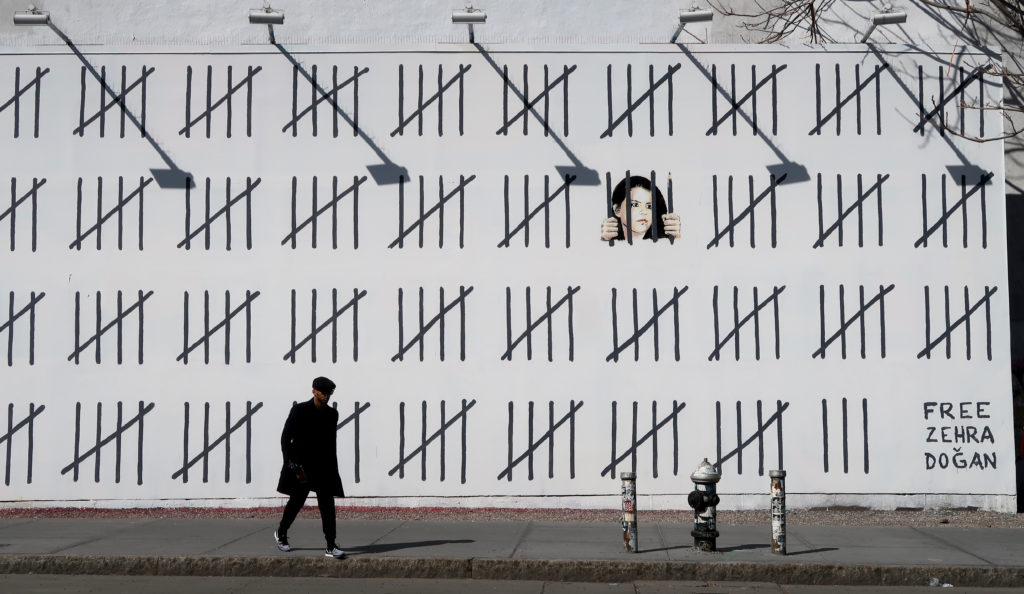Bianet, February 26, 2021, image: Gary Hershorn/Getty Images
Freemuse, an international organization defending artistic freedom, has released its “State of Artistic Freedom 2021” report, analyzing 978 acts of violations of artistic freedom in 89 countries and online spaces in 2020.
“Since the 2016 attempted coup, which led to arrests and imprisonment of thousands of people, including long-standing human rights defenders and critics of the government with no history of violence, freedom of artistic expression has continuously been curbed in Turkey.”
On 25 February 2021 Freemuse launched its flagship report on THE STATE OF ARTISTIC FREEDOM 2021 during the online session of the Re:Writing the Future Festival in Berlin, a four-day event organised by Allianz Kultrurstiftung in partnership with ICORN – International Cities of Refuge Network in cooperation with DAAD Artists-in-Berlin Program and Maxim Gorki Theater Berlin.
The report has documented an analysis of 978 acts of violations of artistic freedom in 89 countries and online spaces in 2020.
According to the report, 17 artists were killed, 82 were imprisoned and 133 were detained worldwide last year.
In 2020, 26 percent of all documented restrictions of artistic freedom took place in Europe, followed by 22 percent in North and South America, 19 percent in the Middle East and North Africa, 15 percent in Asia and Pacific, 9 percent in Africa and 9 percent online.
74 percent of all documented imprisonments of artists concerned criticising government policies and practices, with 44 percent of all imprisonments happening in the Middle East and North Africa. Politics was the main rationale of 71 percent of detentions of artists.
Commenting on the findings of the report, Srirak Plipat, the Executive Director of Freemuse, has briefly said:
“It is unimaginable that the record high of prosecution and imprisonment of artists will happen to be in the year when artists and the culture sector have already suffered the loss of their livelihood.
“This year’s report illustrates increasing misuses of blasphemy, anti-terrorism legislation, and COVID-19 measures as pretexts, to silence dissident voices of artists and artworks .”
‘Government is still a major obstacle’
The Freemuse report has shown that of the 254 acts of violations that happened in the world in 2020, 72 of them were in Turkey.
While 82 artists were known to be imprisoned in 20 countries in 2020, seven of them were imprisoned in Turkey. Of the 107 prosecuted and 133 detained artists in the world last year, 17 were in Turkey.
Aiming to illustrate varying problems and obstacles artists face in different parts of the world, Freemuse has also provided an analysis of the state of artistic freedoms in 15 countries, namely Bangladesh, Belarus, Brazil, China, Cuba, Egypt, India, Iran, Kenya, Kuwait, Nigeria, Russia, Turkey, Uganda, and the United States of America (USA).
Accordingly, under its Turkey section, Freemuse has shared three main findings about the state of artistic freedoms in Turkey:
“Government authorities continued to be a major obstacle for the exercise of artistic freedoms in Turkey, being responsible for 90 percent of all cases of violations Freemuse documented in 2020.
“Kurdish artists and cultural centres were particularly vulnerable to targeting by state authorities.
“A vague framework of anti-terror law and criminalised insults against the president were behind more than half of the documented violations.”
‘Kurdish artists are particularly vulnerable’
Further in its section on Turkey, the report has said:
“Since the 2016 attempted coup, which led to arrests and imprisonment of thousands of people, including long-standing human rights defenders and critics of the government with no history of violence, freedom of artistic expression has continuously been curbed in Turkey.
“Kurdish artists are particularly vulnerable. They face a variety of obstacles to express themselves artistically for fear of prosecution alongside economic hardships caused by limited opportunities to perform. As a result, many have felt that they have no option but to flee Turkey.
“The turmoil in regions where the pro-Kurdish Peoples’ Democratic Party is in power (because of investigations on terrorismrelated charges against local mayors and the government’s appointment of trustee mayors) has further had an unfavourable impact on the Kurdish artistic scene.
“This is exacerbated by the shutting down of dozens of Kurdish cultural centres over the past four years.”
The section has then moved on to elaborate on these findings under two subheadings: Kurdish Artists in Courts on Anti-Terrorist and Insult Charges and Constant Pressure on Cultural Centers Deemed Anti-Government.
You can access the full report here
On the same issue: Theater Ensemble Targeted in Turkey for Kurdish Performances; Accused of “Terrorist Propaganda”, Hyperallergic, February 18, 2021, Ayla Jean Yackley

